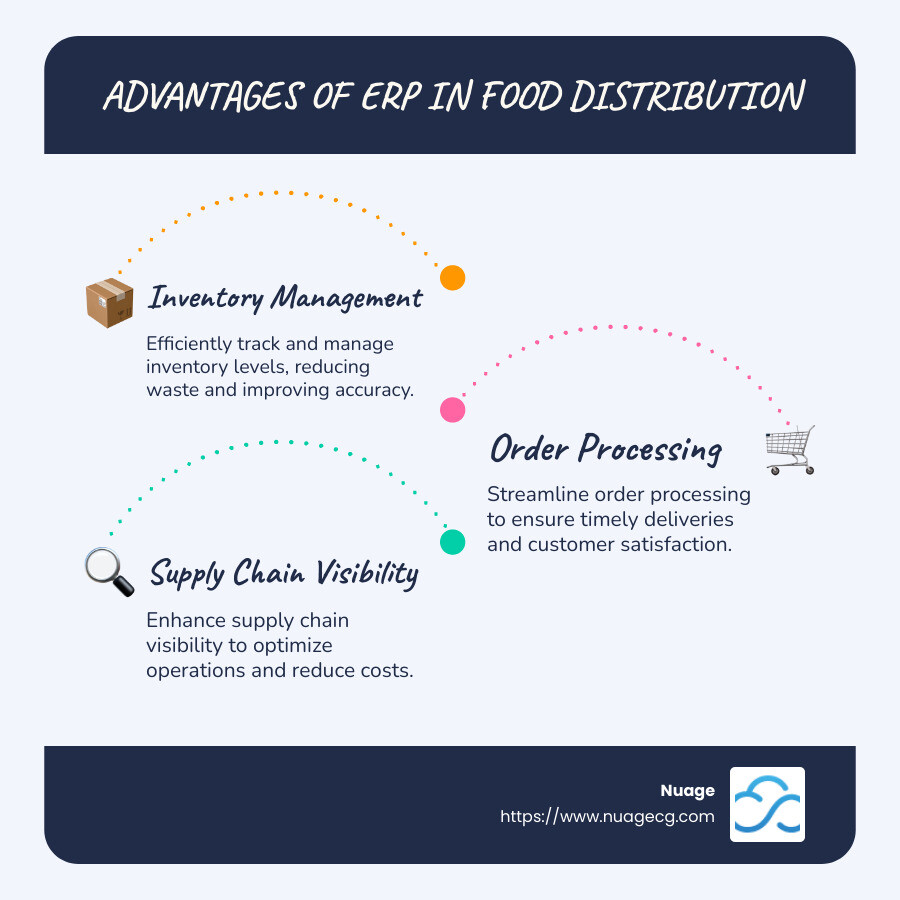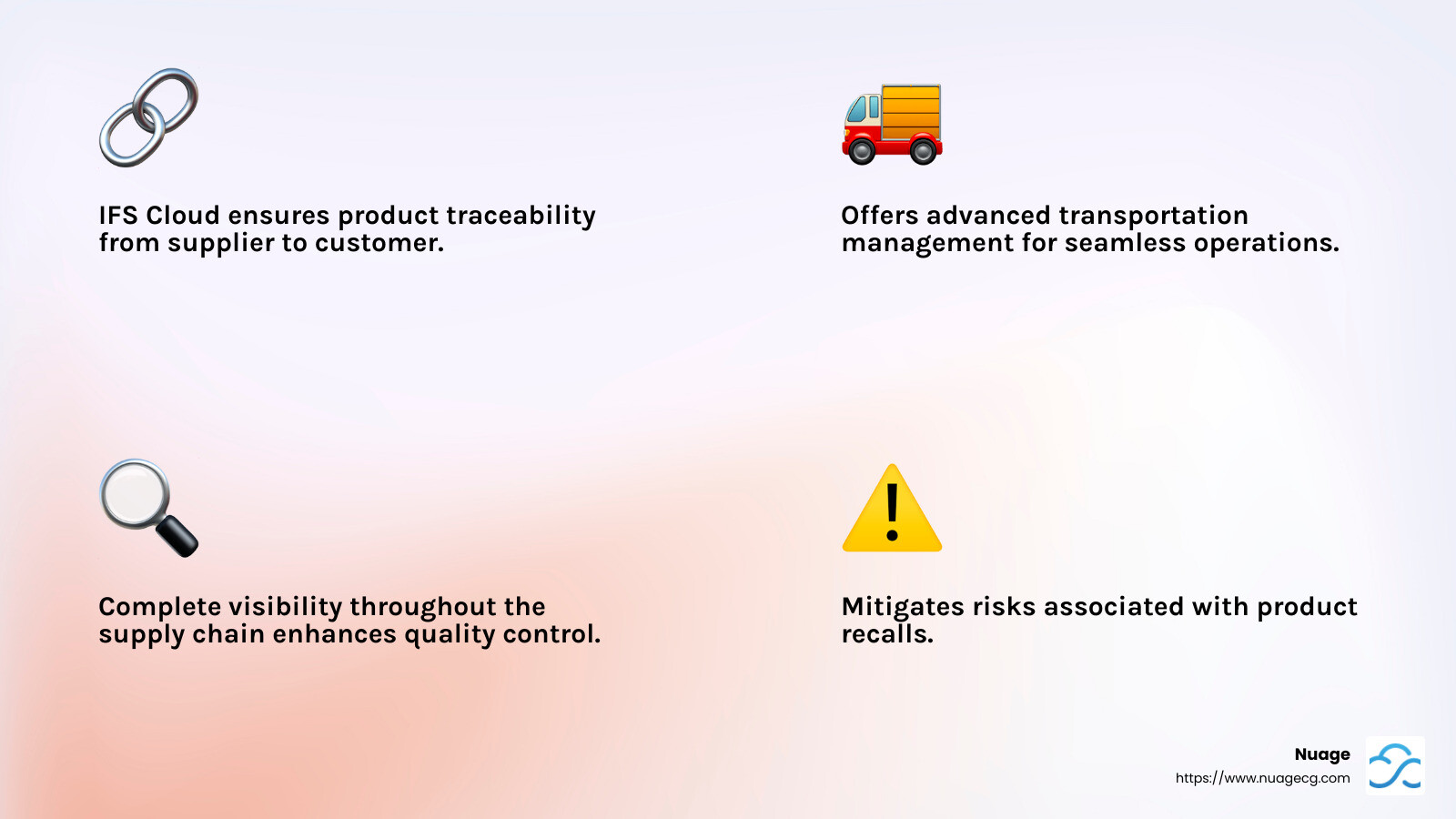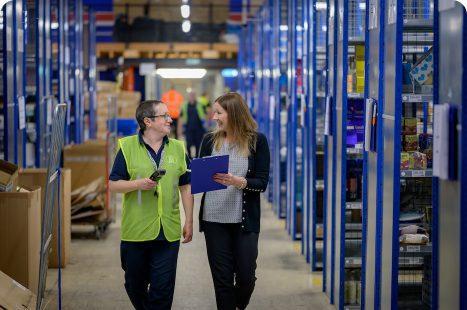Food Distribution ERP: Top 5 Best Solutions 2025
Looking for food distribution erp solutions? Here’s a quick answer:
- Helps manage inventory and streamline supply chain
- Improves compliance with food safety regulations
- Improves operational efficiency with real-time data
- Reduces transportation costs
In today’s rapidly evolving technology landscape, the intersection of food distribution and ERP (Enterprise Resource Planning) is crucial for growth and efficiency. Food distribution ERP systems address the need for streamlined operations, efficient inventory management, and compliance with food safety regulations. This foundation supports businesses in navigating digital change, enabling them to scale effectively and maximize margins.
As an expert in digital change solutions, I’ve been helping companies transition to sophisticated ERP systems like and NetSuite for over 15 years. My name is Louis Balla, and I’m here to guide you through the intricate world of food distribution ERP.

Understanding Food Distribution ERP
Food distribution ERP systems are the backbone of a food distributor’s operations, touching every part of the process from inventory management to order processing and supply chain visibility. Let’s break down these key components.
Inventory Management
Efficient inventory management is crucial for food distributors. With the right ERP system, you can track every item in your warehouse, know exactly what you have in stock, and predict when you’ll need more. This prevents overstocking and understocking, which can lead to wasted resources or missed sales opportunities.
For example, SK Food Group, a leading custom food manufacturer, uses an ERP system to streamline its inventory processes. This helps them compare purchase orders and sales delivery documents seamlessly, reducing shipping delays and improving efficiency.
Order Processing
Order processing is another area where food distribution ERP shines. It automates and simplifies the steps from receiving an order to delivering the product, resulting in fewer errors, faster processing times, and happier customers.
An ERP system can also integrate with your sales and purchasing platforms, providing a single view of your operations. This integration helps ensure that customer orders are fulfilled accurately and on time, enhancing customer satisfaction and loyalty.
Supply Chain Visibility
Supply chain visibility is all about knowing where your products are at any given time. With an ERP system, you can track materials from receipt through delivery, ensuring that everything is moving smoothly. This visibility is essential for maintaining quality and compliance with food safety regulations.
A robust ERP system like or NetSuite provides real-time data that gives you a holistic view of your supply chain. This allows for quick decision-making and helps mitigate risks, such as product recalls or transportation delays.
In summary, food distribution ERP systems offer comprehensive solutions for managing inventory, processing orders, and maintaining supply chain visibility. These systems are essential for food distributors looking to improve efficiency, reduce costs, and enhance customer service.
Next, we’ll dive into the top ERP solutions for food distribution and how they can benefit your business.
Top ERP Solutions for Food Distribution
When it comes to food distribution ERP, several solutions stand out for their unique features and capabilities. Each of these systems offers distinct advantages that can help streamline operations, improve efficiency, and ensure compliance. Let’s explore some of the top ERP solutions available today.
is a robust ERP solution that excels in traceability and transportation management. It offers seamless integration of procurement and supplier management into supply chain processes, providing complete visibility from the original supplier to the end customer. This level of traceability not only ensures product quality but also helps mitigate risks associated with recalls.

By connecting supply chain and production line requirements, enables maximum production capacity and helps drive competitive advantage. This makes it an ideal choice for food distributors looking to optimize their operations and improve customer service levels.
For more information, visit our page.
NetSuite
NetSuite is renowned for its real-time data capabilities and comprehensive financial management features. It allows food distributors to manage their entire business on a single cloud platform, providing transparency across all business functions. This real-time visibility helps businesses make informed decisions quickly and efficiently.
The platform supports multi-location inventory management with complete farm-to-table traceability. It also handles orders across various channels, ensuring a seamless buying experience for customers. With NetSuite, food distributors can gain a 360-degree view of their operations and customers, empowering employees with the information they need to excel.
Learn more about NetSuite on our NetSuite page.
SYSPRO
SYSPRO is custom for manufacturing and distribution, offering full traceability from receipt to delivery. This ERP system is designed to help distributors rapidly identify, quarantine, and retrieve potentially defective goods, improving governance and compliance. SYSPRO’s focus on traceability makes it a reliable choice for maintaining quality standards and managing product recalls efficiently.
Infor M3
Infor M3 is a cloud-based ERP solution specifically designed for the food industry. It offers advanced capabilities for compliance and production management, ensuring that food distributors can meet local, state, and federal regulations. Infor M3’s cloud-based nature allows for flexibility and scalability, making it suitable for businesses of all sizes looking to grow and adapt in a dynamic market.
Sage X3
Sage X3 provides a comprehensive solution for compliance and production management. Built on the Sage X3 platform, FoodBusiness ERP helps companies manage manufacturing, tracking, inventory, sales, finance, and quality. It addresses key challenges such as accurate forecasting, inventory management, and compliance with food safety regulations, enabling food distributors to maximize margins and grow their businesses.
Each of these food distribution ERP solutions offers unique features and benefits custom to the needs of food distributors. By choosing the right system, businesses can improve their operations, improve efficiency, and better serve their customers.
Next, we’ll explore the benefits of implementing a food distribution ERP system and how it can transform your business.
Benefits of Implementing Food Distribution ERP
Implementing a food distribution ERP system can revolutionize how your business operates. Let’s break down the key benefits:
Efficiency
A well-integrated ERP system boosts efficiency by automating manual tasks and reducing the time spent on repetitive processes. For example, SK Food Group, a major player in North America’s food manufacturing sector, used FoodBusiness ERP to streamline purchase orders and sales delivery. This integration reduced shipping delays and maximized efficiency, allowing them to focus more on growing their business.
Cost Reduction
ERP systems help businesses cut costs in various ways. By providing accurate demand forecasting and optimizing inventory levels, companies can reduce excess stock and minimize waste. This was evident in the research, which highlighted that ERP solutions like NetSuite offer complete supply chain visibility. This visibility helps companies manage their resources better, reducing transportation costs and improving overall financial management.
Customer Service
With real-time data access, ERP systems improve customer service by ensuring that orders are processed accurately and efficiently. NetSuite, for instance, allows distributors to handle orders from multiple channels seamlessly. This capability ensures that customers receive a consistent and smooth buying experience, whether they order online, via a call center, or through a B2B portal. By having a 360-degree view of customer interactions, businesses can respond quickly to inquiries and resolve issues, leading to higher customer satisfaction.
In summary, implementing a food distribution ERP system can significantly improve your business’s efficiency, reduce costs, and improve customer service. Next, we’ll dive into the key features you should look for when choosing an ERP solution for your food distribution business.
Key Features to Look for in Food Distribution ERP
When selecting a food distribution ERP, it’s crucial to focus on features that address the unique challenges of the food industry. Here are the top features you should consider:
Lot Tracking
Lot tracking is essential for managing perishable goods and ensuring food safety. This feature allows you to track products from the moment they enter your inventory until they reach the customer. Systems like excel in providing full traceability, enabling businesses to quickly identify, quarantine, and retrieve potentially defective goods. This capability not only helps in managing recalls efficiently but also ensures compliance with safety regulations.
Automated Processes
Automation is the backbone of efficiency in any ERP system. By automating repetitive tasks, businesses can reduce human error and free up resources for more strategic activities. For instance, automated processes in NetSuite streamline order processing and inventory management, ensuring that stock levels are maintained accurately without manual intervention. This leads to faster order fulfillment and improved customer satisfaction.
Compliance Management
Food distributors must adhere to strict local, state, and federal regulations. Compliance management features within an ERP system help ensure that your operations meet these standards. Sage X3, for example, offers robust compliance tools that help businesses maintain quality standards and manage production processes effectively. By keeping your operations compliant, you minimize the risk of legal issues and build trust with your customers.
Incorporating these features into your food distribution ERP will not only streamline your operations but also improve your ability to meet industry standards and customer expectations. Let’s address some frequently asked questions about ERP in the food industry.
Frequently Asked Questions about Food Distribution ERP
What is ERP in the food industry?
ERP in the food industry is a software solution that integrates various business processes into a single system. It helps manage everything from order management to inventory levels, ensuring that operations run smoothly. For food distributors, ERP systems like NetSuite offer real-time data access, allowing businesses to track inventory levels accurately and manage orders efficiently. This integration helps in reducing waste and improving the overall supply chain visibility.
How does ERP improve distribution?
ERP systems improve distribution by improving data management and communication across the supply chain. With features like automated order processing, businesses can ensure that orders are fulfilled quickly and accurately. This reduces delays and improves customer satisfaction. Systems like provide transportation management tools that optimize delivery routes, cutting down on transportation costs and improving delivery times.
What challenges does ERP address in food distribution?
ERP systems tackle several challenges in food distribution, including:
-
Financial Data Management: By providing a centralized database, ERP systems like NetSuite offer real-time financial insights. This helps businesses make informed decisions and improve budgeting and forecasting accuracy.
-
Transportation Costs: ERP solutions optimize logistics and transportation routes, reducing fuel consumption and delivery times. This leads to significant savings in transportation costs.
-
Inventory Management: With accurate inventory tracking, ERP systems prevent overstocking and stockouts. This ensures that perishable goods are managed efficiently, reducing waste and improving profitability.
By addressing these challenges, food distribution ERP systems streamline operations and improve the ability of businesses to meet customer demands effectively.
Conclusion
As we’ve explored, implementing a robust food distribution ERP system can revolutionize the way food distributors operate. At Nuage, we specialize in guiding businesses through this digital change journey. With over 20 years of experience, we understand the unique challenges faced by the food and beverage industry and offer custom solutions to meet these needs.
Our expertise lies in providing strategic guidance to harness the full potential of ERP solutions like NetSuite and . These platforms offer real-time data access, improved financial management, and improved supply chain visibility, enabling food distributors to operate more efficiently and effectively.
Digital change is not just about adopting new technology; it’s about changing your business processes to drive growth and improve customer satisfaction. With Nuage as your partner, you can confidently steer this change, leveraging the best of ERP technology to streamline operations and achieve your business goals.
Take the first step towards changing your food distribution business today by exploring our NetSuite offerings. Let us help you steer your business towards a future of confidence and success.
